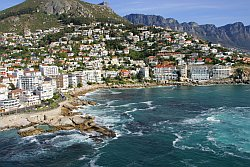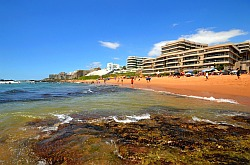A consequence of the 2007/2008 economic recession was the marked impact on South Africa’s leisure and coastal market, which hit a slump. With the onset of the recovery of the national property market, signs of an uptake in the leisure market, particularly following the holiday season in December 2014/January 2015, have been noticed.
 Premiums on South African coastal property are on the rise, for example, in areas like Bantry Bay on the Atlantic Seaboard in Cape Town.
Premiums on South African coastal property are on the rise, for example, in areas like Bantry Bay on the Atlantic Seaboard in Cape Town.This is according to Dr Andrew Golding, chief executive of the Pam Golding Property group says this can be seen when looking at the latest (June 2015) Pam Golding Residential Property Index.
“As the revival in the residential property market has become more entrenched, it has precipitated the return of the holiday buyer, with many capitalising on the opportunities for sound value for money presented in the current market,” he says.
For most leisure buyers, Dr Golding says the coastal lifestyle, whether for permanent residence or holiday getaways, represents easy-going, fun living with sun and sea, free of traffic, pollution and the crime often associated with large cities.
“Notably, the last time that coastal areas enjoyed a price premium over non-coastal regions was during the 2004 residential property boom. The coastal premium then re-emerged in late-2013, a trend which continued into 2015.”
While the premium remains narrow, he says in the face of an ongoing supply of leisure properties, the sector is clearly benefiting from renewed interest among cash-flush buyers.
“Some of South Africa’s most luxurious properties are found in the country’s coastal areas, as buyers are often willing to pay a significant premium for properties within walking distance of the beach.”
A recent Lightstone study of the average of property values within the coastal region, namely properties located within 500m of the beach, revealed that the degree of the coastal property premium varies between different provinces and holiday towns.
 Dr Golding says areas appealing to coastal and leisure buyers include destinations on the south coast of KwaZulu-Natal, like Ballito.
Dr Golding says areas appealing to coastal and leisure buyers include destinations on the south coast of KwaZulu-Natal, like Ballito.Dr Golding says the study concluded that coastal property prices are significantly influenced by the combination of the specific town and the distance of a property from the beach.
The price impact gradually diminishes as the distance from the beach increases, until a distance of about 600m to 800m. It is generally at this point that buyers can expect that properties will no longer command a coastal premium.
The Pam Golding Residential Property Index shows that the current emerging premium, which emerged in October 2013 and remains to January 2015 (latest available data), remains relatively small.
In line with the recovery in Lightstone’s coastal index, FNB’s Holiday Towns house price index similarly registered a modest rebound in 2014 and early-2015.
However, he says an ongoing glut of leisure properties in the market, particularly in coastal areas, is currently capping the strength of any rebound in prices. The still conservative attitude of financial institutions towards mortgages for secondary properties is similarly limiting the recovery in prices in this market.
“Despite these pressures, the market is starting to attract the attention of buyers, particularly in the traditional leisure property suburbs like the Western Cape’s Atlantic Seaboard and Garden Route and KZN’s north coast.”
Dr Golding says other areas appealing to coastal and leisure buyers include destinations on the Western Cape’s Southern Peninsula Western Seaboard and up the West Coast, on the Eastern Cape coastline, and south coast of KZN.
“The local leisure market is also benefiting from renewed interest in second homes among the world’s high net worth individuals (HNWIs), who consider real estate an important asset class,” he says.








